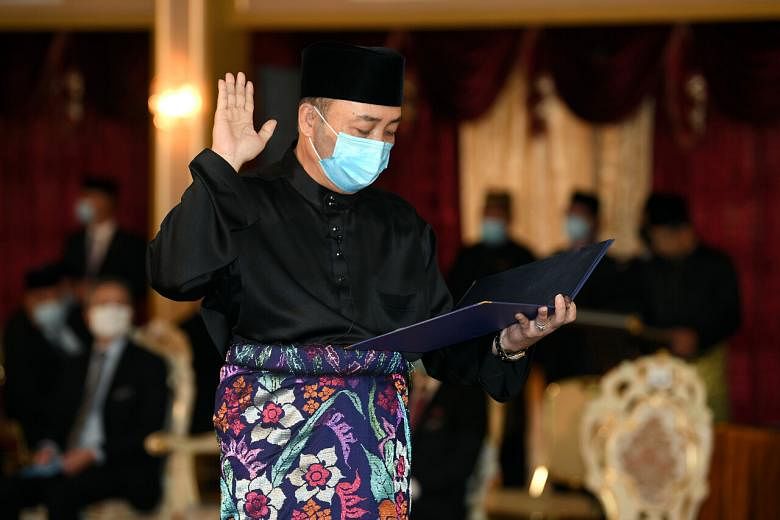KOTA KINABALU - Mr Hajiji Mohd Noor, a leader from Prime Minister Muhyiddin Yassin's Perikatan Nasional (PN) coalition, was sworn in as the new Sabah Chief Minister on Tuesday morning (Sept 29), three days after Tan Sri Muhyiddin's loose alliance managed to wrest control of the state administration during the state polls.
Mr Hajiji, 65, will be the 16th Chief Minister of Malaysia's eastern-most state after being sworn in by Governor Juhar Mahiruddin. He is the Sabah chief for both PN and Parti Pribumi Bersatu Malaysia (Bersatu) - Mr Muhyiddin's party.
Mr Hajiji was chosen as the chief minister candidate by the Gabungan Rakyat Bersatu (GRS) alliance, after intense negotiations that lasted 36 hours.
He has drawn support from 41 out of 73 lawmakers elected last Saturday - 38 from GRS and three independent winners.
Mr Hajiji's appointment is another big win for Mr Muhyiddin, who is facing a leadership challenge in Parliament from opposition leader Anwar Ibrahim.
Despite GRS members clashing with one another in 17 seats and unable to agree on a chief minister candidate throughout the campaign, Mr Muhyiddin managed to steer GRS to a win at the state polls.
The impasse over the chief minister post threatened to undo GRS' victory, opening a door for Parti Warisan Sabah to try and form the state government again, but GRS unanimously agreed to go with Mr Muhyiddin's personal pick on Monday.
Mr Hajiji, who was elected as the assemblyman for Sulaman for an eighth term last Saturday, was previously a Sabah state minister.
He was also appointed Sabah deputy chief minister for just one day in 2018, serving under former chief minister Musa Aman's short-lived administration before defections saw Warisan leader Shafie Apdal form the government instead.
The Sabah state election was called after PN, led by Mr Musa, attempted to form the state government in late July after securing 13 defections from the Warisan administration.
However, Mr Juhar opted to dissolve the assembly and call for fresh elections instead of swearing in a third chief minister for the same term.
In 2018, after the elections produced a hung assembly, Mr Musa initially secured a thin majority and was sworn in, before Mr Shafie secured a bigger tranche of defections and was subsequently sworn in two days later.
It remains to be seen if the state can see some political stability in its administration after turmoil over the past two years.
With 38 seats to Warisan's 32, GRS does not have a huge margin, and the working relationship between PN and Barisan Nasional (BN) - the biggest component of Mr Muhyiddin's federal alliance - in Sabah remains to be seen.

The tension between PN and BN - each wanted its own candidate to be made chief minister before relenting - was palpable during election night, with both parties celebrating the win at different command centres.
Since Mr Hajiji's selection, top BN leaders have made public statements saying they were reluctant in giving up the post to PN and indicated that they would not continue to be accommodating.
Last week, Mr Anwar claimed to have secured the support of several Umno lawmakers, who were unhappy with PN and Mr Muhyiddin, to enable the opposition chief to form the new federal government.
However, Mr Anwar's claims have yet to be backed as he has been unable to secure an audience with the Malaysian King to demonstrate his purported majority.


